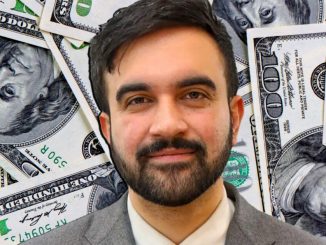
| Published July 5, 2025
President Trump pledges to watch the self-proclaimed socialist ‘very carefully on behalf of the nation’
🗳️ The Controversy: Racial Identity on Columbia Application
-
In 2009, Zohran Mamdani marked both “Asian” and “Black or African American” on his Columbia University application, and also hand‑wrote “Ugandan” in an open field.
-
Mamdani, born in Kampala to Indian Ugandan parents and raised in New York, says his intent was to reflect his complex heritage—not to gain an admissions advantage—emphasizing that at the time Columbia lacked a category for Indian‑Ugandans.
-
He clarifies that he does not personally consider himself Black or African American, describing himself as “an American who was born in Africa”.
Political Fallout & Reactions
-
Mayor Eric Adams and Andrew Cuomo have urged a formal investigation, claiming the race selection may amount to fraud.
-
Fox News hosts and Republican figures labeled Mamdani “racist” or exploiting identity, with some comparing it to Elizabeth Warren’s claims of Native American ancestry.
-
Within NYC’s Black community, many called it misleading at best or fraudulent at worst, accusing him of exploiting racial identity .
Broader Political Context
-
Mamdani, a 33‑year‑old Muslim and Democratic Socialist, won the Democratic mayoral primary with 56%, defeating Cuomo.
-
His progressive policies (rent freezes, free transit, higher taxes on the wealthy) have drawn attacks from Republicans—including Trump, who labelled him a “communist lunatic,” and called for scrutiny of his citizenship.
-
Fact‑checkers like PolitiFact and Al Jazeera confirm Mamdani is not a communist, but rather a democratic socialist, debunking those extreme claims.
-
He’s also facing Islamophobic backlash, with opponents accusing him of extremist ties and questioning his faith.
-
Congressional GOP members have even pushed for a citizenship review, though legal experts stress that proven naturalization fraud is required for denaturalization.
👤 Mamdani’s Response & Background
-
Reelected to the New York State Assembly in 2021, Mamdani is a dual citizen of Uganda and the U.S. (naturalized in 2018), and a Shia Muslim.
-
He significantly emphasizes his multi‑ethnic identity—Indian, Ugandan, American—and has publicly stated choosing multiple racial boxes was honest, not opportunistic.
-
With deep roots in progressive politics, he’s known for housing advocacy, union endorsements (e.g., SEIU, Nurses Association), and is backed by the NYC DSA.
 Implications
Implications
🏛️ 1. Political Weaponization of Identity
-
Mamdani’s racial self-identification is being used by Republicans and moderates as a political weapon.
-
This may solidify support among progressive voters who see him as under attack for being honest about his background.
-
But it could erode trust among centrist or Black voters who may feel racial identity was misused.
⚖️ 2. Legal & Institutional Precedent
-
If investigations move forward, it could set a dangerous precedent where college application race selections are used decades later to launch fraud claims.
-
It also raises questions about the limits of identity disclosure in education—especially for multiracial or immigrant-background individuals.
🧭 3. Race and Admissions Debate
-
The controversy reignites national discussions about race-based college admissions, especially after the 2023 SCOTUS affirmative action ruling.
-
Conservatives are likely to use this case to argue that racial identity can be manipulated for advantage.
🧨 4. Risk of Overreach by Critics
-
Calls for citizenship revocation (e.g., from Trump allies) may appear extreme and xenophobic, potentially backfiring among immigrant and minority voters.
-
These efforts could energize Mamdani’s base and frame him as a victim of a right-wing witch hunt.
🌍 5. Broader Cultural Tensions
-
The situation reflects ongoing American tensions around race, religion, and nativity—especially for non-White, Muslim, or immigrant candidates.
-
Mamdani’s rise could signal a generational and demographic shift in political leadership, prompting backlash from traditional power structures.
🔄 6. Electoral Impact
-
Mamdani’s campaign may suffer in swing boroughs like Staten Island or parts of Queens.
-
But if he leans into the narrative of being persecuted for his heritage, he could mobilize progressive, minority, and youth voters—especially in the Bronx and Brooklyn.
 Overall Takeaway:
Overall Takeaway:
Zohran Mamdani’s decision to identify as both “Black” and “Asian” on his Columbia application—despite being of Indian descent—raises serious questions about integrity and political opportunism. While he now claims it reflected his Ugandan birthplace and complex background, the timing and ambiguity of his identity choices suggest a pattern of exploiting systems meant to help historically marginalized groups.
In a time when Americans are demanding fairness, merit, and transparency, this case underscores the flaws in race-based admissions and the potential for abuse by those who play identity politics for personal or political gain. Voters deserve leaders who are honest, consistent, and grounded in principle—not figures who retroactively redefine their past to fit a narrative.
If Mamdani can’t be trusted to truthfully fill out a college application, can he be trusted to run America’s largest city?





Be the first to comment